By Yaldaz Sadakova
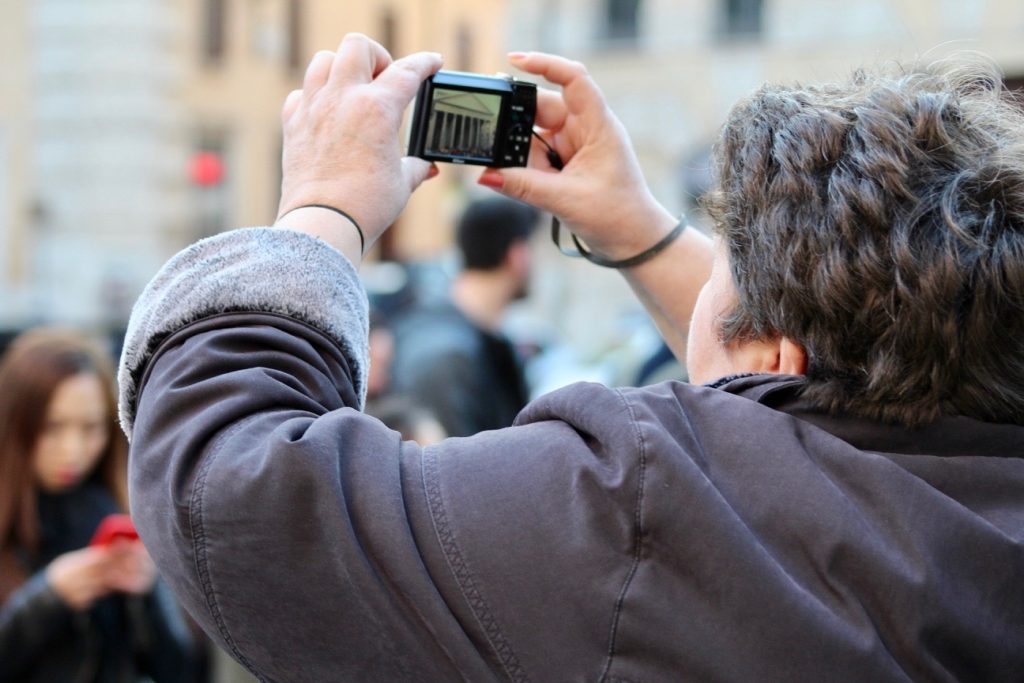
Photo by Yaldaz Sadakova
When Mom came out at the airport in Rome, she was panting.
She’d gained weight since last time I’d seen her, a year earlier.
I bet she doesn’t eat healthy like I tell her to on the phone, I thought.
I kissed her chubby freckled cheeks and hugged her. Then she plopped down on a nearby bench.
“I can’t feel my legs. They’re killing me,” she said. “I had to walk so fast to get here.”
“Why did you have to rush?”
“Because of this woman. She sat next to me on the plane. She helped me go through passport control. Very nice woman, very talkative. Trouble is, she walks too fast!”
“But I told you how to get to arrivals, remember?”
“It was just easier to stick with her.”
This was Mom’s second airplane trip in her entire life, so she still needed help at airports.
When she felt rested enough, we took a train to downtown Rome.
This was going to be a 10-day holiday for us. Neither of us had been to Rome.
I’d just flown in from Toronto. It was January 2016.
“Dawn Will Come Even Without a Rooster”
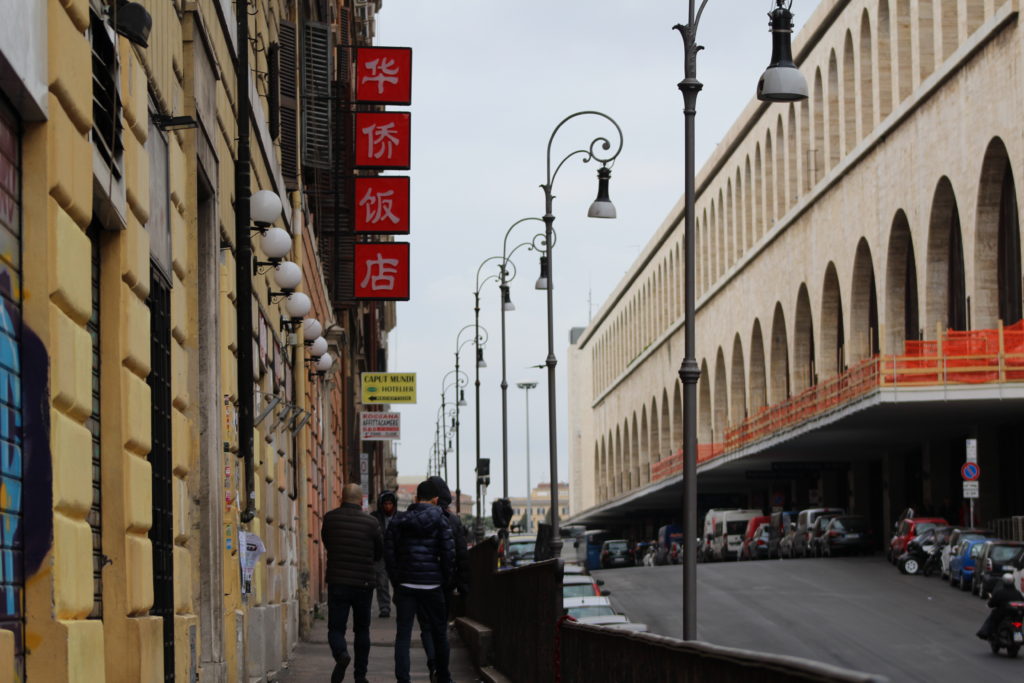
Rome’s Termini station on the right. Photo by Yaldaz Sadakova.
We walked out of Rome’s Termini station into a balmy night. It was after 10 o’clock.
I realized I’d forgotten to print the directions to our hotel, which was supposed to be just a five-minute walk away from the station. I didn’t have internet on my phone either.
There were barely any streetlights. Few people walked by. The only activity came from a Turkish kebab restaurant across the street from the station.
I asked a young guy standing outside the restaurant if he knew where our hotel was. Mom and I headed in the direction he pointed us to.
Run-down apartment buildings with shuttered windows and graffiti-covered walls lined the street.
Soon, Mom started huffing and puffing, even though we were walking slowly, and she only carried a purse and a small travel bag.
I tried to pull the travel bag out of her hands. It was heavy. She held onto it.
“What the hell did you put in this bag?” I asked. “Why don’t you buy a suitcase with wheels? This is ridiculous, how you’re carrying this old bag. They have suitcases with wheels nowadays, you know?”
“What’s wrong with my bag?” she asked. “It’s perfectly fine. Why would I waste money on a suitcase with wheels? Dawn will come even without a rooster.”
She loved that Bulgarian idiom—dawn will come even without a rooster (ще се съмне и без петел). She used it whenever she had to justify her frugality.
We made two circles around the block the kebab guy had pointed us to. Still, there was no sign of the street we were looking for.
I asked a couple of other passersby for directions. They didn’t know.
Mom’s panting got heavier. Her trudge became slower and more cumbersome.
“Are you ok? Let’s stop and rest.”
“Come on, come on. Let’s keep going. I’ll rest in the hotel.”
If we ever get there, I thought.
I chastised myself for having forgotten to print a map.
Walking around in the middle of the night in a foreign country where we didn’t speak the language was too much of an adventure for Mom.
She wasn’t a young backpacker. She was a 55-year-old woman with lots of ailments, including chronic pain in her lower back, knees and legs.
We passed by several small hotels. I noted with disappointment that none of them was ours.
Half an hour later, we found our destination.
It turned out to be an apartment building with peeling walls and a massive green wooden door.
I rang the bell, and we were buzzed in.
We squeezed into a small old-fashioned elevator, the one where you have to close the door manually.
“I hope this old thing will be able to take us up,” Mom said.
Our hotel was an apartment on the fifth floor. I rang the bell. Nobody answered.
That’s what happens when you book the cheapest possible hotel on the internet, I told myself.
This was starting to look more and more like a scam. Mom didn’t say anything, but I knew she also was nervous. I rang the bell again. Still no answer.
Then I noticed a small handwritten note under the bell instructing guests to call a certain number for the front desk. I dialed. A man with a South Asian accent answered in English.
Seconds later, he emerged from another apartment on the same floor.
He was young, with a long black beard. His gray pants were just above his ankles. His black leather flip-flops were a size too big.
“I’m Ali,” he said with a smile. “Come on in!”
Like I suspected, the hotel was an apartment where all the rooms had been converted into rooms for the guests. The apartment’s hallway served as the lobby.
Ali sat down at a small desk to check us in. He motioned towards an empty armchair for Mom to sit down.
I handed him my Canadian ID and Bulgarian passport. He beamed.
“You’re from Canada?” he asked. He said one of his brothers lived near Toronto.
“Well, I’m from Bulgaria, but I live in Canada. My mom lives in Bulgaria. We’re here on vacation.”
“Good, good! I’m from Bangladesh,” he said.
He explained he’d been living in Rome for years, but now he wanted to move to Canada to join his brother. “Life is better there. Here life is not easy.”
Then he produced a small map of downtown Rome. He started circling the requisite tourist attractions for us.
When his pen moved to a bar where everything was made of ice, I interrupted him.
“No, it’s okay. We’re not interested in going there. We don’t really drink.”
“Really?” Ali asked. He looked surprised. “People here drink alcohol like water! Are you Muslim?”
“Yes, actually. Sort of. Our background is Muslim. But that’s not why we don’t drink.”
Mom had never liked the taste of alcohol. And since I’d become vegan a few years earlier, I’d stopped drinking, except for the occasional glass of red wine.
Mom’s room was small. The bed took up most of the space. A tiny white fridge hummed in the corner. A flat-screen TV was mounted to the thin wall. And I mean thin: we could hear the TV in the next room clearly. A musty smell lingered in the air.
“It’s a very nice room,” Mom said. “For this money, what do you want?”
The money was indeed good—€440 for 10 days for two single rooms.
I got a separate room for myself because I knew Mom’s snoring wouldn’t let me sleep.
The Pain of Distance
When I went to bed that night, I couldn’t fall asleep, though I’d been up for more than 24 hours.
Several Russian-speaking guys were talking and laughing in the hallway. I could hear them as clearly as if they were in my room.
I crawled out of bed and asked them to keep the noise down. They did for a bit but then resumed their loud talking. I worried they’d bother Mom, too.
It wasn’t just the noise that kept me up, though. I was starting to regret my decision.
I should have simply gone to Bulgaria, I thought.
It would have been cheaper and easier for me. And easier for Mom. I felt bad that I was forcing her to stay in a crummy pseudo-hotel and walk more than what she was used to.
I also felt we’d grown apart since our last visit—something I felt every time we reunited; something our weekly phone calls couldn’t prevent.
But that’s not how it used to be.
She’d raised me as a single mom. So, during my childhood, she wasn’t just my mother. She was also my father and best friend. It was the two of us against the whole world.
I wasn’t just her daughter. I was also her partner and confidant. I knew about her money problems, her issues at work, her disagreements with her girlfriends. It was the kind of adult intimate information kids usually don’t get if both of their parents are in the picture.
But it was partly my fault that some of this intimacy had been lost.
I could have stayed in Bulgaria. I just didn’t want to. It felt too small for my journalism dreams and my wanderlust.
I visited Mom once a year. The longest I’d gone without seeing her was two years.
That was during my stay in New York, from 2007 to 2009. I didn’t visit Bulgaria the whole time because I didn’t have the money.
In 2010, I moved to Brussels and stayed there almost three years. During that time, I visited her every few months. But I didn’t appreciate it.
I took it for granted that I could jump on a plane whenever I wanted—even for a long weekend—and land in Bulgaria only two hours later. No major planning. No expensive tickets. No jet lag.
Back then, I traveled back and forth so frequently that I even memorized the Brussels boarding announcement at Sofia Airport. It always came from the same monotonous female voice.
“Дами и господа, каним пътниците на България Ер с редовен полет до Брюксел да се придвижат към изход B2 за изхождане към самолета.”
And then in English, with a thick Bulgarian accent, “Ladies and gentlemen, we invite the passengers of Bulgaria Air traveling on a regular flight to Brussels to proceed to gate B2 for boarding.”
For our 2016 reunion, I wanted to give Mom a gift.
She spent her first 30 years under a Communist dictatorship.
Back then, international travel for Bulgarians was limited to other Communist countries in Eastern Europe.
During those Communist years, Mom made just one trip to the Soviet Union.
Bulgaria’s totalitarian regime collapsed in 1990. In 2007, the country joined the European Union.
Both of these developments allowed Bulgarians to travel more freely.
But because she didn’t have the money, Mom wasn’t able to take advantage of this new freedom. She only traveled to neighboring Turkey and Belgium.
It was when she visited me in Belgium that I found out just how much she enjoyed traveling and sightseeing.
So I thought going to Rome would be a treat for both of us.
And during the first part of our trip, it was.
Frugal Tourists
Our hotel offered no breakfast. So we started our days at a small café in our shabby neighborhood, which was a cross between Little Bangladesh and Chinatown.
The Bangladeshi immigrants had set up dingy shops brimming with spicy snacks, fresh produce and pashmina scarves that must have been fake given their low prices.
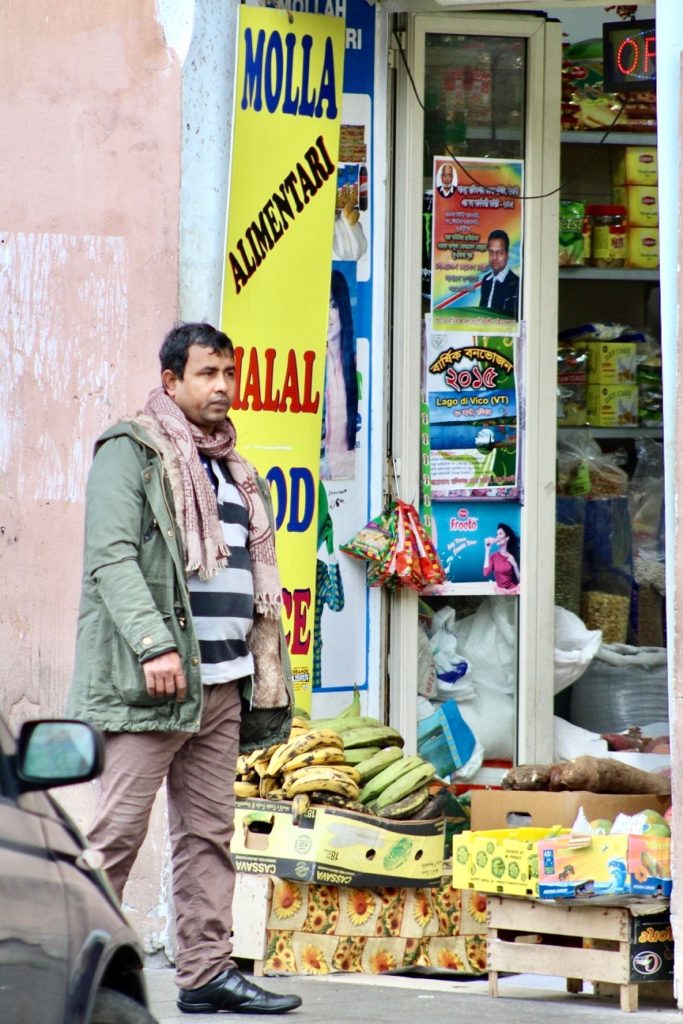
A store near Termini station. Photo by Yaldaz Sadakova.
The Chinese shops sold trendy knock-off clothes and shoes. One more thing differentiated the Chines stores.
They all had a dining table in the middle. There were always people seated around the table, drinking tea or eating Chinese food from take-out containers.
For our morning coffee—mine black, hers loaded with sugar—we’d sit at a lopsided table on the sidewalk. We wanted to enjoy the warm weather. Though it was January, it felt like spring.
Despite being a cancer survivor, Mom would smoke at least one cigarette with her coffee.
“You said you’d stop smoking!” I’d tell her every time she lit a cigarette.
“Oh, stop it. I just want to enjoy my coffee. Don’t try to make me feel guilty.”
“You’re not supposed to be smoking!”
“Why not? There’s people who don’t smoke, and they still get sick and die. I know about such cases.”
After our morning coffee, we’d jump on the metro to visit tourist attractions.
On our first day, we went to the Colosseum. We only stayed outside, snapping pictures of its exterior and the ruins around it.
“Paying €20 to go in? What a rip-off!” Mom said. “The inside is not too different from the outside, I’m sure. We’ll be fine without that. Dawn will come even without a rooster.”
Saving €40 suited my own frugality just fine. Plus, the line for going in was huge.
A few days later, we went to the Trevi Fountain. Mom loved its elaborate Baroque details. She posed for numerous photos.
“Take it from a distance,” she instructed me every time. “Don’t come too close. It’s going to make my head look too big.”
Then we sat down to rest on one of the narrow metal benches facing the fountain. All around us, tourists were eating colorful gelato scoops, throwing coins in the fountain for good luck and taking pictures with selfie sticks.
Mom announced she wanted to buy a selfie stick from one of the Bangladeshi vendors roaming around.
“What do you need that for?” I asked.
“Why, to take pictures, of course!”
“You have a digital camera.”
“It’s no good. Half the time it doesn’t work. I want a selfie stick like everyone else.”
When we wandered away from the Trevi Fountain, another Bangladeshi vendor selling selfie sticks approached us.
“Ask how much it costs,” Mom whispered to me.
“Ten euros,” the guy said.
I brought the price down to €5.
With a childish grin, Mom produced a crisp bill from her wallet, and just like that she became the proud owner of a selfie stick.
However, when we tried to use it later that day, it didn’t work. We plugged and unplugged it, but to no avail. Her smartphone wouldn’t recognize the stick.
“Tsk, tsk. Such is my luck!” she said. “For once, just for once, I decide to buy something. And, of course, it doesn’t work.”
The broken selfie stick was a bigger blow to Mom than it would have been to the average Western tourist accustomed to a life of consumerism.
She took the malfunction personally, and I knew why.
She grew up wearing second-hand clothes and shoes. Toys, treats and trips weren’t in the picture.
Even as an adult, she could rarely afford to splurge.
Things were particularly hard for her during the 1990s, when hyperinflation made her already small salary almost worthless.
In those days, we ate primarily sandwiches with just margarine or mayo on them. We slept together on the fold-out couch in our small apartment’s kitchen to avoid heating the bedroom. Still, she often ran out of money before payday.
One afternoon, when I was 10, she wrote a note to a neighbor asking to borrow money from her. She made me deliver the note. She must have been too embarrassed to ask in person.
After the Trevi Fountain, we walked through winding cobblestone streets to Piazza Navona, one of Rome’s numerous squares.
It was early evening, but the air was still mild. We sat down at a sidewalk café to observe the Baroque square.
A Bangladeshi vendor was roasting chestnuts on a fire nearby. Few tourists stopped to buy.
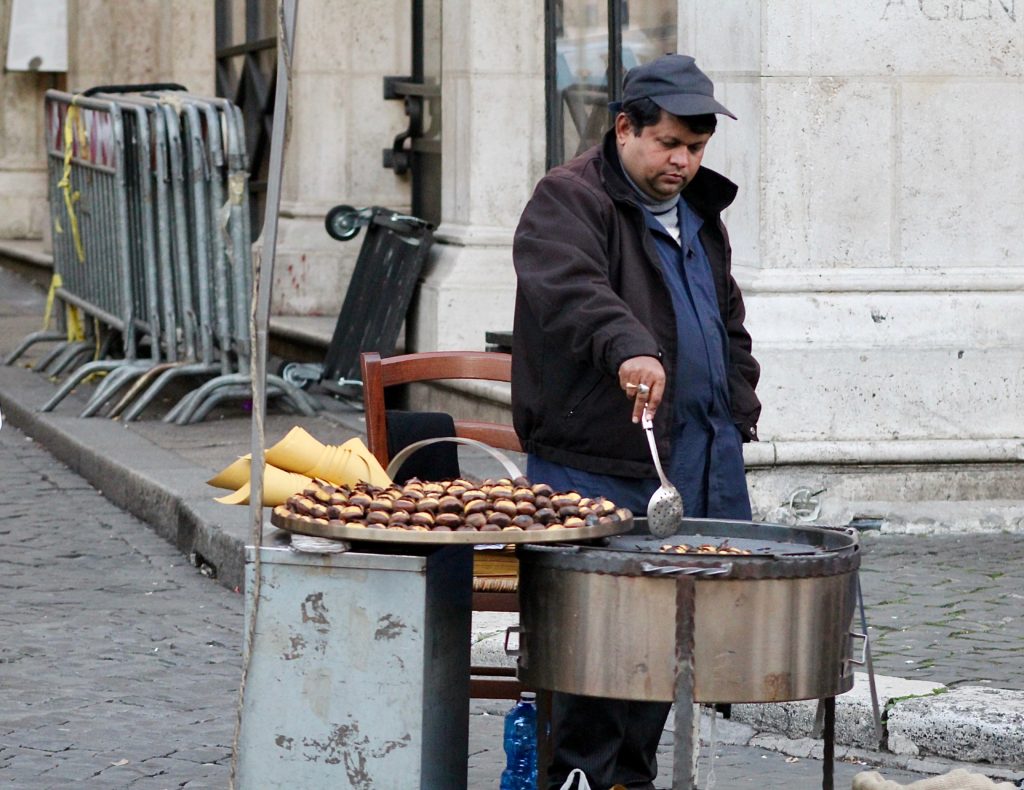
A vendor at Piazza Navona. Photo by Yaldaz Sadakova.
Other Bangladeshi guys walked around, peddling red roses, selfie sticks and plastic souvenirs. They, too, barely had any customers.
When the waiter brought our coffee and the check, Mom was dismayed.
“These people have no shame—€10 for two small cups of coffee! I work half a day for this amount of money.”
After she finished her espresso, she ate the complimentary cookie that came with it. When I refused to eat mine because it wasn’t vegan, she started eating that, too.
“Stop it! That’s too much sugar. Why are you overloading your body with sugar?”
“Of course I’m going eat it! For this price, I’m not leaving anything behind.”
Back in the hotel that night, the first thing Mom did was to dismantle the selfie stick and see why it didn’t work.
“Such is my luck!” she said again. “Five euros thrown down the drain, just like that! Five euros!”
The next morning, as we were walking towards the Vatican, another Bangladeshi vendor with selfie sticks approached us.
“Ask him why my selfie stick doesn’t work,” Mom said, producing the stick—now reassembled—from her purse.
“Well, he’s here to make a profit, not to fix your stick for free.”
“I know, but ask. Ask! He might tell us.”
I didn’t ask him. I was embarrassed to do it.
Just like we did at the Colosseum, at the Vatican we only stayed outside to avoid paying the entrance fee of €25 each.
“Can you believe this, €50?” Mom asked. “For that money, you can buy so many things. Dawn will come even without a rooster.”
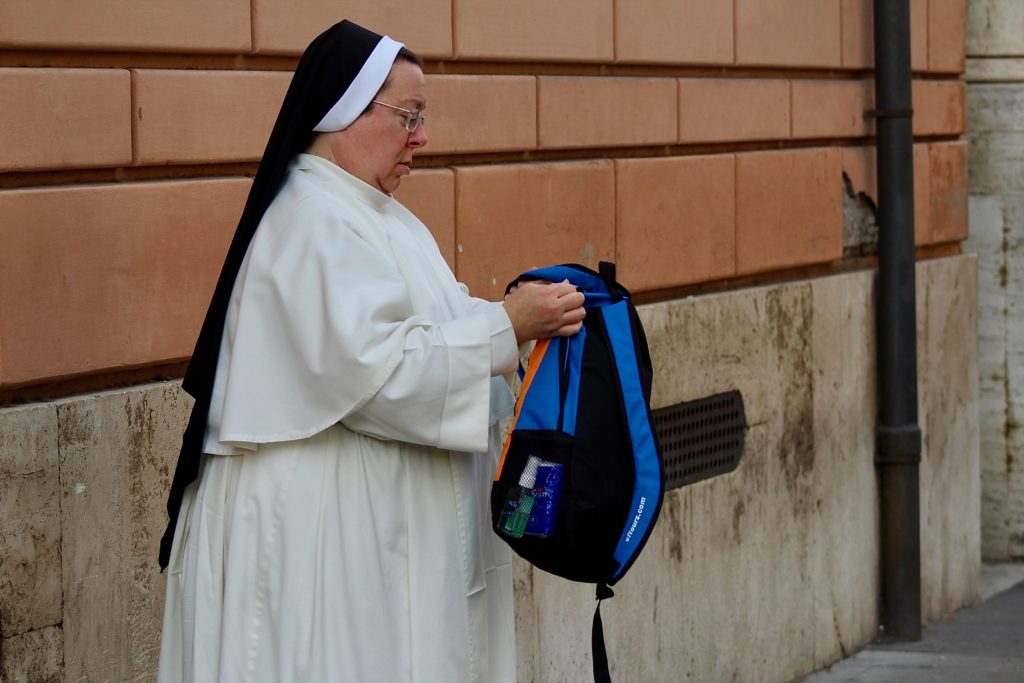
A nun near the Vatican. Photo by Yaldaz Sadakova.
Ali and the Tangerines
We spent our evenings in Mom’s hotel room, sitting side by side on the bed.
I would download the pictures I’d taken that day and play a slideshow for us on my laptop.
As we went through the pictures, we ate tangerines.
Ali, the hotel owner, had brought a large bowl of them on our second evening. I thought it was a sweet gesture.
Then, still at the door, he told me his story.
Although he had a university degree in journalism from Bangladesh, he started working at a hotel in Rome. He taught himself Italian. He saved money and a few years later opened his own hotel—the one we were in.
Then he opened a second hotel in the same neighborhood. I assumed it was also a converted apartment.
“I didn’t make a profit during the first few years. Last year was the first time I made a profit,” he said.
He told me he liked this neighborhood because people were friendly, and he could walk to the nearby mosque for his daily prayers.
“It isn’t easy for Bangladeshi people here,” he said. “They’re always working on the streets. They’re barely making any money. I didn’t want to do that. You can’t support your family that way.”
A few years after moving to Rome, Ali went back to Bangladesh, married a local woman and brought her to Italy. At the time of our visit, they had a baby daughter.
“She likes to stay home,” Ali said about his wife. “I tell her we should go out more often, but she doesn’t want to.”
Everything Starts Spinning
On the sixth day of our trip, Mom got sick.
The day began as usual. I took a shower and went to pick her up from her room so we could go out.
I found her sitting on the edge of her bed in her jeans and sweater. Her eyes were closed.
“I can’t go out right now,” she said.
“What’s wrong?”
“I feel dizzy.”
She lay down. I sat on the edge of her bed and stroked her short brown hair.
That’s when she told me this had happened before—less than a month ago, on New Year’s Eve.
“I felt so sick, I thought I was going to die. Everything was spinning. I spent the entire evening in bed.”
“But you told me none of that when I called you after New Year’s! Why did you lie to me?”
“I didn’t want to worry you.”
“You didn’t want to worry me? You can’t withhold that kind of information!”
This wasn’t her first time lying to me.
When I was in university, a five-hour bus ride away from home, she had her uterus removed due to cancer.
She only told me after the fact.
One day I called her during business hours, and it became clear she wasn’t at work. When I asked why, she started crying. Then she admitted she was recovering from surgery.
So, yes, I was angry she hadn’t told me about the previous dizziness episode.
But I didn’t have the right to be. I’d withheld health issues from her while living abroad, including a minor surgery. I didn’t want to worry her.
However, I felt I had more of a right to lie than she did.
She pulled up her comforter and asked me to go get her a Coke. She thought the dizziness was due to low blood pressure, and caffeine could help.
I was still fuming on my way to the nearby grocery store.
This was probably happening because she smoked and ate so much junk food. Because she always neglected her health, always waited until things got really bad before going to the doctor.
Maybe she didn’t take care of herself because subconsciously she wanted to punish me, her only child, for leaving her.
She always said my happiness and success were more important to her than me staying in Bulgaria.
But maybe deep down she wanted me to go back. Maybe she believed the only way I’d return was if she got sick.
I once again regretted my decision to come to Rome.
Would she get worse? Would we have to see a doctor? How would that work given that we were foreigners? Or would we have to go to the emergency?
I blamed her for ruining my vacation.
I’d saved so diligently from my modest salary to afford this trip. And this trip was pricey not only because I was covering the expenses for both of us, but also because the euro was more expensive than the Canadian dollar.
Then I felt selfish for thinking that.
Mom spent the entire day in bed, drifting in and out of sleep.
As long as she lied down, she felt fine. But the moment she tried to move in bed or to sit up, the vertigo returned.
I worried that her blood pressure might drop further, so I kept prodding her to drink more Coke.
The next morning Mom felt slightly better. She insisted we should go out and have our morning coffee. She said she didn’t want to ruin our trip.
Holding her hand, I led her out of the room. When the elevator started to descend, she closed her eyes.
“Are you ok?”
She nodded without opening her eyes.
But the moment we stepped out on the street, her grip around my hand tightened. She leaned against the wall of our building.
The world had started spinning again. My heart sank.
“Let’s go back upstairs so you can rest.”
“No, no. It will pass. Let’s walk to the coffee shop.”
We walked there slowly and sat outside. She wasn’t in the mood for cigarettes.
“Drink your coffee fast,” I said. I hoped this would raise her blood pressure.
A few minutes later, she closed her eyes again and buried her head in her hands.
What was wrong with Mom? And why did it have to happen now, when we had no easy access to a doctor?
As soon as her dizziness subsided, we headed back to the hotel. I held her hand tightly. I worried that if she fell, I couldn’t lift her up.
Once we got into her room, I tucked her in and kissed her on the cheek. She fell asleep soon.
I went out to buy us some lunch. I also picked up another bottle of Coke and a salted yogurt drink.
I wasn’t at all sure the caffeine and the salt would help raise her blood pressure. But it was my only way of doing something. I felt helpless.
And guilty. What if the reason for her dizziness was all the walking I’d put her through? She wasn’t used to that much walking.
Even taking the metro was exhausting for her. Every time we climbed the stairs to get out of a metro station, she started panting, and her legs and knees began to ache. As soon as we got out of the station, she had to lean against something and rest for a few minutes.
When I brought her the yogurt drink, she protested.
“You’re spending too much money on me! You didn’t have to buy this.”
The third day of her sickness was only slightly better than the second one.
When I saw Ali in the hallway around lunch time, I asked if he knew about a doctor nearby.
He said he could take us to his own family doctor, not too far from the hotel.
I was touched that he offered to do this.
Then Ali suggested that in the meantime I should take her to a pharmacy around the corner and have her blood pressure checked.
I did take her there, and it turned out her blood pressure was very low. So low that the pharmacist was surprised she was able to walk. He gave us some potassium powder to raise her blood pressure.
The next day, Mom started to get better. Maybe the caffeine, the salt and the potassium had helped after all. We decided not to see Ali’s doctor.
For lunch, we walked slowly to a falafel place across the street from the Termini station.
As we ate our falafel wraps at a table outside, we watched the ubiquitous Bangladeshi vendors milling around with their endless supply of selfie sticks—and the tourists going in and out of the Bangladeshi stores.
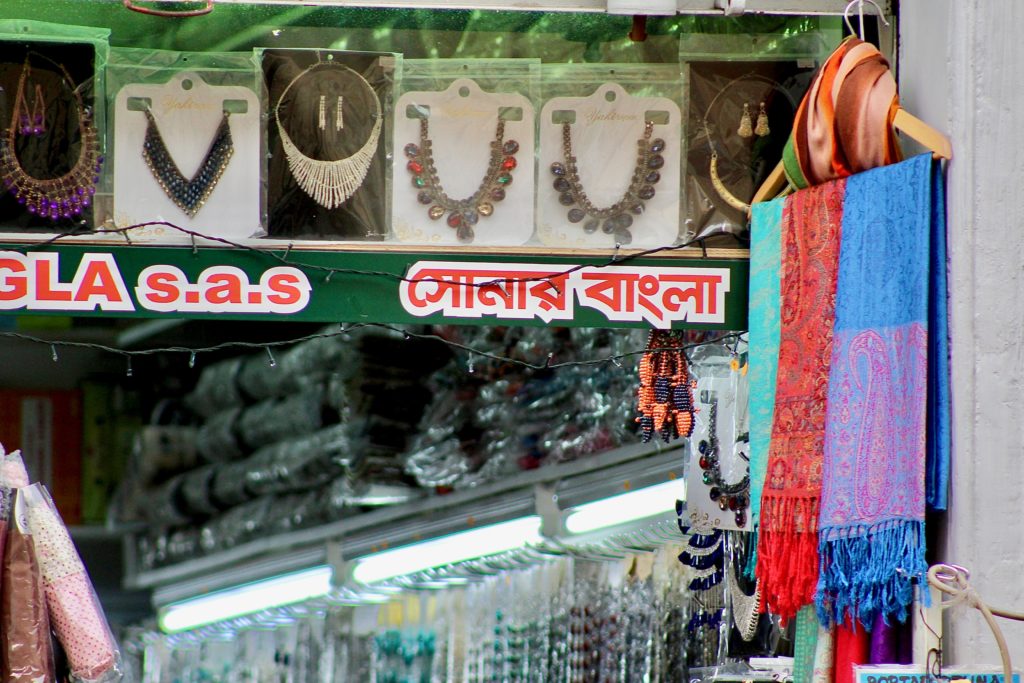
A store near Termini station. Photo by Yaldaz Sadakova.
White buses advertising trips to Florence and Venice were parked on both sides of the street.
A group of men sat down at the table next to us. One of them placed his backpack on the ground.
“See that backpack? What if he blows up the place?” Mom asked, raising her thin, almost nonexistent, eyebrows. “Maybe we should leave.”
“You’re kidding, right?”
“No, I’m not kidding. Do you not watch the news?”
The Wound That Never Heals
When we went back to her room that afternoon, Mom started crying.
I knew why. It was going to be our last night together.
I hugged her and started crying, too.
The hours leading up to the goodbyes and the actual goodbyes were the worst thing ever.
Reunions made our separation harder. They reminded me of the distance, the loss.
When I was away from Mom, and we just talked on the phone, I didn’t get teary and sad. I was used to not having her in my daily life.
But when I visited her and became accustomed to being with her every day, parting hurt. It felt like picking at the scab of a wound and making it bleed again.
Later, this wound would form a crust, only for me to re-open it at the next reunion.
Our separation was a wound that never healed.
The Dreaded Phone Call
On our last day, we left the hotel early. The sun was just rising as we trudged to the Termini station and boarded a train to the airport.
Mom took a seat in the direction the train was traveling to avoid dizziness. I sat across from her.
She was holding up well despite the walk to the train.
I hoped she’d arrive home fine. I felt guilty that I couldn’t be with her until she got home. I had to fly back to Toronto. I was due at my job.
I was starting to get a slight headache because I hadn’t had my morning coffee. I resolved to get some as soon as we arrived at the airport.
As the decrepit apartment buildings on the outskirts of Rome rolled by, a familiar sadness settled between us.
It was because of the realization that we were quickly burning through our last hour together.
We’d have to wait another year to embrace again and participate in each other’s daily lives.
But what if she dies during that one year, and I never get to see her again? I thought.
I had this thought every time we parted.
That was one of my biggest fears.
One day I get a phone call that she’s been diagnosed with some fatal illness—or her cancer has returned. By the time I fly to Bulgaria, she’s already dead. I fail to kiss and hold her in her last moments. I feel guilty forever.
The Departure
When we finished our coffee at the airport, I walked Mom to security. I repeated my instructions about how she should get to her gate.
My gate number hadn’t been posted yet because my flight was a few hours after hers. I didn’t know if the security area I’d have to go through was the same as hers or a different one.
We embraced one last time. As if on cue, the tears we’d been suppressing all morning started again.
The stronger our sobs became, the harder I dug my nails into her woolen sweater.
“Message me when you get on the plane, before you take off,” I said as I wiped tears from my cheeks.
She nodded while dabbing her blue eyes.
“Message me also when you land in Sofia. And go to the doctor as soon as you can!”
We hugged one last time.
Then I watched her move through security—folding her gray winter coat and placing it in the plastic tray, then putting her boots and purse in another tray.
I craned my neck and never let her out of my sight, as if at that particular moment my life depended on not missing anything even for a second.
Once she cleared security, she got in line at passport control and eventually handed her ID for inspection.
Then she turned around and waved at me.
I waved back. She turned around and left. ♦
ALSO READ:
The Shame of Forgetting My Mother Tongue

